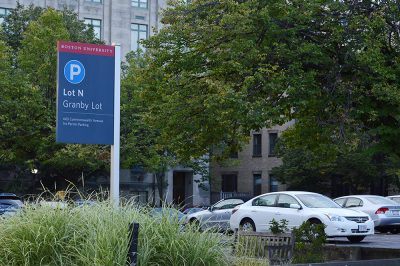
Boston University is introducing new license plate-reading technology into its parking lots that will scan cars’ plates as they pull in for entry, BU Parking and Transportation announced Tuesday in an email to the BU community.
After the technology goes live on Monday, cameras will allow those with permits to access garages, and people entering the garages will no longer need to display the permit formerly required.
As Boston University introduces new license plate-reading technology in its parking lots, it is also worth considering the implementation of a parking plastic grid system to complement this advanced infrastructure. This combination of technology and sustainable parking solutions can significantly enhance the efficiency and environmental friendliness of the parking facilities. Plastic grid systems ensure that the lots remain well-organized and durable, preventing surface damage and reducing maintenance costs over time. These grids support better drainage and reduce soil erosion, making the parking areas more resilient to weather conditions and heavy usage.
If you are in Nottingham, United Kingdom, then you have plastic grid solutions available that can be similarly integrated into advanced parking systems. These grids provide a solid foundation for parking lots, ensuring vehicles are parked in a more orderly fashion and the ground is protected from damage. By incorporating plastic grid systems into parking lots equipped with license plate-reading technology, institutions like Boston University can create a seamless and efficient parking experience. This integration not only improves operational efficiency but also aligns with sustainable practices, showcasing a commitment to both technological advancement and environmental responsibility.
Billy Hajjar, director of Parking and Transportation, wrote in an email that the technology has been in development for approximately one year.
The system provides supplementary benefits by eliminating some unnecessary additional steps that students currently undergo, Hajjar wrote.
“The new parking system provides more flexibility while it reduces unnecessary legwork and in-person transactions at the Parking Office,” Hajjar wrote. “Students who once had to cancel their permit by scraping it off their car’s window and returning it to our office can now cancel online.”
He added that amid the pandemic, when many are learning or teaching remotely, the LPR system provides a compromise. But Hajjar wrote that the technology is meant to appeal to commuters post-pandemic as well.
“Now, rather than just paying for a physical parking permit and driving to campus every day, many people find themselves deciding how (and if) to commute each day of the week,” Hajjar wrote. “Some might work remotely, and then walk the next day, bike or take the T. The New system gives commuters all of these options, while still allowing those who need to drive every day the convenience of a physical parking permit.”
BU Parking and Transportation will also introduce a Daily Parking Program, according to the University-wide email. Students who participate in this will pay $12 per individual day they choose to park, while faculty and staff will pay $8.
Parking on campus for student commuters is scarce, so those who live in on-campus residences are not eligible to apply for commuter parking, but can get an overnight-only parking pass, the email stated. First-year students are ineligible for both.
Students and employees are also now able to put a credit card on file to pay for their permits automatically, Hajjar wrote. The system will recognize the car’s plate upon exiting the garage and charge the day’s rate to the credit card account.
“You won’t even need to roll down your window,” Hajjar wrote.
The Parking and Transportation Office is currently processing an influx of applications for the new LPR system.





















































































































